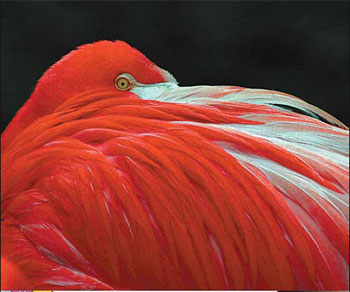Birds too take power naps to alert
HAMBURG, Germany: Just like busy executives who work 14-hour days, birds take "power naps" to keep their senses alert for predators, according to German researchers.
In their pioneering study, researchers from the Max-Planck Institute of Ornithology in Seewiesen, Germany, showed for the first time that birds compensate for sleep loss in a manner similar to humans.
|
Asleep or keeping an eye on things? A flamingo takes a "power nap" in the daytime at Frankfurt Zoo. DPA |
And just as in humans and all mammals, bird sleep consists of two phases: Deep, dreamless slow-wave-sleep (SWS) alternates with apparent dream phases, called Rapid Eye Movement (REM)-sleep.
While it is not known whether birds actually have dreams, this study shows that birds are the only taxonomic group other than mammals to show both SWS and REM sleep.
Dolores Martinez-Gonzalez and colleagues at the Max Planck Institute for Ornithology in Seewiesen found that birds - in this case pigeons - also take "power naps" when they are deprived of sleep.
In their study, the sleep researchers prevented pigeons from taking a short siesta, something they generally do during the last hours of a day. During the night, the birds were allowed to sleep normally.
Although the time spent in SWS did not increase during recovery, the amount of slow-waves did increase, just as in mammals.
This means that pigeons, and presumably other birds, have the capacity to recover lost sleep without having to spend more time sleeping.
"If pigeons lose sleep when a predator is around, they can recover this lost sleep at a later time by sleeping more deeply. This intensity dimension to avian and mammalian sleep may give animals a certain degree of flexibility in how they acquire their daily sleep requirement," says Niels Rattenborg, co-author of the study and head of the research group Sleep and Flight in Birds at the Institute.
The way sleep is regulated in birds and mammals seems to be more similar than previously thought. This increases the chances of learning more about the function of sleep in humans by studying sleep in birds.
DPA
(China Daily 04/23/2008 page19)















